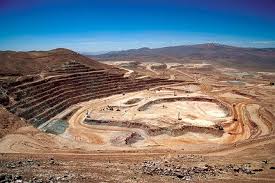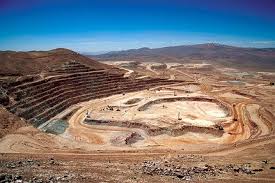
The chairman of a well-known business group stated that more had to be done by governments around the globe to persuade indigenous and local communities to support mines that generate vital minerals needed to power the energy transition and combat climate change.
Opposition to mines is growing worldwide due to religious, ecological, or other grounds; this pressure appears to have increased in the last year as Panamanian officials closed a mine that provides 1% of the world's copper in response to protests.
However, in an attempt to slow down the rise in global temperatures, more people are using electric cars, solar panels, and other technologies that require a lot of copper, nickel, and other essential minerals.
The CEO of the International Council on Mining and Metals, Rohitesh Dhawan, told Reuters on the fringes of the World Copper Conference in Santiago this week that if governments are serious about addressing climate change, they need to figure out how to move forward with some projects rather than relying on businesses and host communities to work out a settlement amongst themselves.
After a career in consulting, Dhawan joined ICMM in 2021. "Now that we have governments more actively engaged in increasing the supply of critical minerals... that comes with a responsibility to help broker an effective and trusted relationship between the industry and impacted communities," Dhawan said.
One of the nations with the greatest abundance of marine resources worldwide is the Philippines.
"We can't have a situation where governments are entirely hands off."
The 24 members of the London-based ICMM, which include BHP and Glencore and together account for nearly one-third of global metal production, are currently reviewing a policy that was first formulated ten years ago regarding the proper manner in which miners should interact with Indigenous communities in accordance with the principle of free, prior, and informed consent (FPIC).
"There's a need for reframing and a need for an honest conversation about where does the responsibility of a mine start and end, and where does the responsibility of government start and end?" stated Dhawan.
Governments are primarily responsible for obtaining FPIC, although industry can help with the review process, particularly when it comes to getting approval for a mine's local impact, according to Dhawan.
He went on, however, to say that the mining business shouldn't necessarily develop a mine if it gets government approval but not local support. "Everybody benefits when we transition to a low carbon economy, but the impacts are always local."
This week's Santiago conference, which attracted over 500 attendees, focused mostly on the conflict between the growing demand for copper and long-standing opposition.
"Everyone wants decarbonisation, but we always have to fight every time we get a permit," stated Roland Harings, CEO of Aurubis, the biggest copper producer in Europe.
Executives admitted that the industry's reputation hasn't always been the finest, particularly in light of the recent spate of fatal mining accidents.
Teck Resources CEO Jonathan Price stated, "We need to be able to demonstrate that we will partner with host communities in a more responsible and long-term manner." Teck Resources is an American company.
Executives from BHP and other companies, as well as Codelco, the state-owned copper behemoth in Chile, repeated that.
"Mining is good for the world, but it needs to be done well," stated Simon Collins of South32, an Australian company that is building a zinc mine with backing from the administration of President Joe Biden in the United States.
(Source:www.reuters,com)
Opposition to mines is growing worldwide due to religious, ecological, or other grounds; this pressure appears to have increased in the last year as Panamanian officials closed a mine that provides 1% of the world's copper in response to protests.
However, in an attempt to slow down the rise in global temperatures, more people are using electric cars, solar panels, and other technologies that require a lot of copper, nickel, and other essential minerals.
The CEO of the International Council on Mining and Metals, Rohitesh Dhawan, told Reuters on the fringes of the World Copper Conference in Santiago this week that if governments are serious about addressing climate change, they need to figure out how to move forward with some projects rather than relying on businesses and host communities to work out a settlement amongst themselves.
After a career in consulting, Dhawan joined ICMM in 2021. "Now that we have governments more actively engaged in increasing the supply of critical minerals... that comes with a responsibility to help broker an effective and trusted relationship between the industry and impacted communities," Dhawan said.
One of the nations with the greatest abundance of marine resources worldwide is the Philippines.
"We can't have a situation where governments are entirely hands off."
The 24 members of the London-based ICMM, which include BHP and Glencore and together account for nearly one-third of global metal production, are currently reviewing a policy that was first formulated ten years ago regarding the proper manner in which miners should interact with Indigenous communities in accordance with the principle of free, prior, and informed consent (FPIC).
"There's a need for reframing and a need for an honest conversation about where does the responsibility of a mine start and end, and where does the responsibility of government start and end?" stated Dhawan.
Governments are primarily responsible for obtaining FPIC, although industry can help with the review process, particularly when it comes to getting approval for a mine's local impact, according to Dhawan.
He went on, however, to say that the mining business shouldn't necessarily develop a mine if it gets government approval but not local support. "Everybody benefits when we transition to a low carbon economy, but the impacts are always local."
This week's Santiago conference, which attracted over 500 attendees, focused mostly on the conflict between the growing demand for copper and long-standing opposition.
"Everyone wants decarbonisation, but we always have to fight every time we get a permit," stated Roland Harings, CEO of Aurubis, the biggest copper producer in Europe.
Executives admitted that the industry's reputation hasn't always been the finest, particularly in light of the recent spate of fatal mining accidents.
Teck Resources CEO Jonathan Price stated, "We need to be able to demonstrate that we will partner with host communities in a more responsible and long-term manner." Teck Resources is an American company.
Executives from BHP and other companies, as well as Codelco, the state-owned copper behemoth in Chile, repeated that.
"Mining is good for the world, but it needs to be done well," stated Simon Collins of South32, an Australian company that is building a zinc mine with backing from the administration of President Joe Biden in the United States.
(Source:www.reuters,com)














